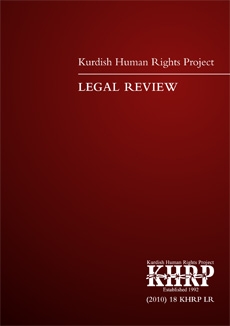| Éditeur : Compte d'auteur | Date & Lieu : 2010, London |
| Préface : | Pages : 124 |
| Traduction : | ISBN : 1748-0639 |
| Langue : Anglais | Format : 150x210 mm |
| Code FIKP : Liv. En. | Thème : Général |
|
Présentation
|
Table des Matières | Introduction | Identité | ||
 Legal Review | |||||
|
Section 1: Legal Developments and News Criticism of extreme penalties for stone-throwing children Earlier this year, the Council of Europe’s Commissioner for Human Rights, Thomas Hammarberg, severely criticised Turkey’s practice of prosecuting minors for participating in alleged terrorist demonstrations in south-east Anatolia, saying the Government’s treatment of children who throw stones violates international standards. The issue of children being subjected to severe sentences for throwing stones at police forces during demonstrations in south-east Anatolia has been on Turkey’s agenda for some time. Following criticism that children were being tried as adults, the Government had intended to amend the relevant law to reduce the applicable penalties but had to shelve the bill in the wake of increasing perceived terrorist uprisings and protests in the region. However, in July 2010, the bill was finally approved, with the new law reducing or waiving jail sentences for young people convicted of throwing stones at police during demonstrations. Although penalties have since been reduced, criticism of penalties towards children and of their access to justice still remains. UN creates single entity to promote women’s empowerment The UN General Assembly voted unanimously on 2 July 2010 to create a new entity merging four UN offices focusing on gender equality. The new UN Entity for Gender Equality and the Empowerment of Women, to be known as UN Women, will merge four existing agencies and offices: UN Development Fund for Women (UNIFEM); the Division for the Advancement of Women (DAW); the Office of the Special Adviser on Gender Issues; and the UN International Research and Training Institute for the Advancement of Women (UN-INSTRAW). UN Women is the result of years of negotiations among Member States and advocacy by the global women’s movement. Set to become operational in January 2011, it aims to ‘drive the world’s efforts to promote women’s rights’, with an annual budget of at least US$500 million – double the current combined resources of the four entities it will consolidate. One of its primary responsibilities is to support the Commission on the Status of Women (CSW) and other inter-governmental bodies in devising policy. The new body is also meant to help Member States implement relevant standards, provide technical and financial support to countries which request it, and forge partnerships with civil society. It will also hold the UN accountable for its own commitments on gender equality. Annual OSCE, UN and CoE meeting: Gender and Comprehensive Security focus During a meeting on 14 June 2010 between the OSCE, the Council of Europe (CoE) and the UN, the OSCE Secretary General, Marc Perrin de Brichambaut, confirmed that achieving peace and stability requires the equal inclusion of both women and men. Gender and comprehensive security was the topic of the annual tripartite meeting. The OSCE, the UN and the CoE issued a Joint Communiqué that reaffirmed the vital role of women in the prevention and resolution of conflicts, in peacemaking, and in the promotion of sustainable peace and security. ..... | ||||